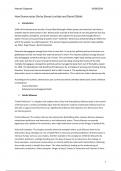Hannah Ongenae 09/06/2024
How Democracies Die by Steven Levitsky and Daniel Ziblatt
1. Introduction
3/4th of the democracies end by a Coup d’état (through military power and coercion), but there is
another way for democracies to die. Democracies may die at the hands of not only generals but also
elected leaders, presidents, and prime ministers who subvert the process that brought them to
power. They do so by promising to build a more “authentic” democracy and pretending to reflect the
will of the people. So-called populism. This process happens gradually and is almost imperceptible.
eg: Hitler, Hugo Chavez , Benito Mussolini
Extremist demagogues emerge from time to time but it is up to the political parties to function as a
gatekeepers and do not except this external person to enter. This requires political courage because
this demagogue sometimes brings a lot of votes. This sometimes might imply making common cause
with rivals, but this of course to keep the democracy from dying. During the history of the USA,
multiple demagogues emerged but political parties managed to keep them out of the ballot, except
for 2016. The Republicans had abandoned forbearance for a strategy of winning and choosing Trump.
However, Trump may have accelerated it but he didn’t cause it. The weakening of American
democratic norms is rooted in extreme partisan polarization. This is what can make a democracy die.
According to the authors, democracies can survive best when unwritten democratic norms reinforce
constitutions:
- mutual toleration
- forbearance (verdraagzaamheid)
2. Fateful Alliances
"Fateful Alliances" is a chapter that explores the critical role that political alliances play in the erosion
of democracies. Levitsky and Ziblatt argue that the decisions made by mainstream political actors to
ally with or against extremist forces can significantly influence the trajectory of a democracy. Here
are the key points:
Critical Alliances: The authors discuss how democratic backsliding often involves alliances between
mainstream politicians and extremists or anti-democratic actors. These alliances can provide
legitimacy and a platform for extremists, who might otherwise remain on the fringes of political life.
Historical Examples: The chapter provides historical examples where such alliances have led to
democratic decay. Notably, the rise of Adolf Hitler in Germany and the breakdown of democracies in
interwar Europe serve as case studies. Another example is the acceptance of Benito Mussolini by
incumbent politicians, willingly handing over the keys of power to an autocrat-in-the-making. In
these examples, mainstream conservatives or centrist politicians allied with radical forces, believing
they could control or benefit from them. This often backfired, leading to the undermining of
democratic institutions. Other examples: Vargas in Brazil, Chavez in Venezuela and Fuijimori in Peru.
1
, Hannah Ongenae 09/06/2024
Motivations for Alliances: Politicians might form these alliances for various reasons, including
short-term political gains, underestimation of the extremist threat, or belief that they can contain the
radical elements. Economic crises, social unrest, and the desire to suppress leftist movements have
historically driven such alliances.
Modern Context: The authors draw parallels to contemporary politics, suggesting that similar
dynamics are at play in modern democracies where mainstream parties sometimes align with
far-right or populist movements. They caution that these alliances can erode democratic norms and
lead to authoritarianism, even if initially formed for strategic reasons.
Consequences: Once in power, extremist groups often seek to dismantle democratic institutions,
consolidate power, and suppress opposition. The initial mainstream allies often find themselves
marginalized or complicit in the erosion of democracy.
"Fateful Alliances" emphasizes the significant impact that alliances between mainstream politicians
and extremist groups can have on the health and longevity of democracies. By examining historical
precedents and drawing lessons for contemporary politics, Levitsky and Ziblatt highlight the risks of
legitimizing and empowering anti-democratic forces through political alliances. The chapter serves as
a cautionary tale about the potential dangers of sacrificing democratic principles for short-term
political gains.
Juan Linz developed a set of four behavioural warnings that can help us know an authoritarian when
we see one:
a) Rejection of (or Weak Commitment to) Democratic Rules of the Game:
An authoritarian may show a lack of respect for the constitution, laws, or democratic norms.
Examples include refusing to accept electoral results, suggesting the cancellation of elections, or
undermining the legitimacy of the judiciary.
b) Denial of the Legitimacy of Political Opponents:
Authoritarians often portray their political rivals as illegitimate, criminal, or a threat to the country’s
well-being. This can manifest as accusing opponents of treason, corruption without evidence, or
other forms of dehumanization and demonization.
c) Toleration or Encouragement of Violence:
A tendency to either tolerate violence by supporters or encourage it against political opponents. This
includes inciting mobs, supporting paramilitary groups, or turning a blind eye to violent acts
committed in their favor.
d) Readiness to Curtail Civil Liberties of Opponents, Including Media:
2




